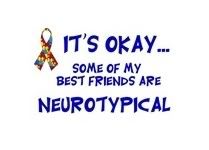
Last week when I listened to Audio on NPR’s Talk of the Nation: A Look at an Autistic Savant’s Brilliant Mind, I noted the points in the discussion with Daniel Tammet that I wanted to revisit. Since my next work project starts tomorrow, and I have a quiet house at the moment, I thought I’d transcribe some of those spots in the program for you.
The first such point in the program came when a caller asked Daniel if he thought that damage could be done to people with Asperger’s Syndrome/Autistic Spectrum Disorders by trying to get them to “be normal”.
Daniel Tammet: I think that’s actually a very good point to make–that, for many people with autism, there is a real challenge to feel that you can fit in with society, and also a question in your own mind, as to whether you should fit in, and to what extent you should sacrifice the things that make you different in order to fit in.
As a child, I would have given everything to be normal. I would have given up all of my abilities in numbers and language, just to be like the other children. Just to feel that I belong. You know, I would sometimes actually stay awake at night in my bedroom, I would look up at the ceiling, I would close my eyes, I would imagine what it might be like to have a friend. Because I had no friends at all, and I had no idea what it would be like to belong, to feel like I could connect with other people. And that was profoundly isolating. And profoundly frightening, actually, although I didn’t necessarily know at the time the words for those feelings I was experiencing.
And now it’s a little bit different. I feel that I’ve reached a point in my life where I have a partner who loves me, I have friends, I have a career, and I’ve overcome so much to reach the point that I have now. And part of what I wanted to write about in the book was to show that such a journey is possible, from profound isolation and sadness to achievement and happiness. Real happiness–not just the happiness that comes from giving yourself up to the trends and expectations of others. But the real happiness that can only come from finding what it is that is unique about you, and having the courage to live that out.
That piece ended just after the 15 minute mark of the program on NPR. I found the whole segment fascinating, but that was the first point where I thought, “Wow, that’s important!”, and noted the time so that I could go back to that part and share it.



Click here for my previous post on Asperger’s Syndrome.